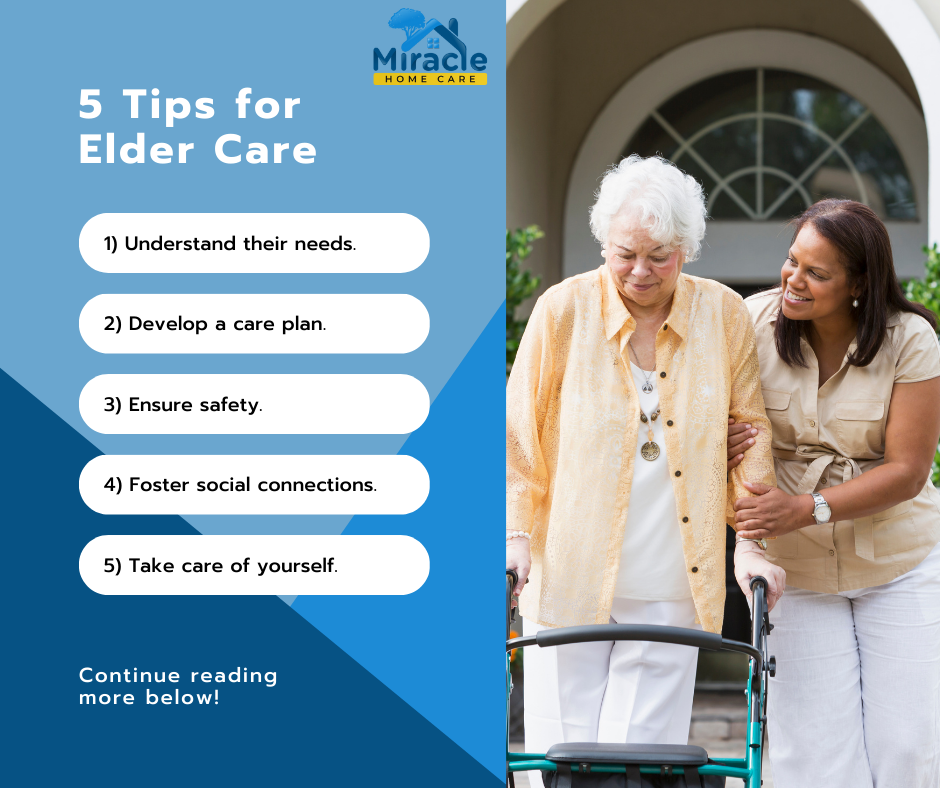As our loved ones age, it can become more difficult for them to live independently. Whether it’s due to physical or cognitive limitations, they may require additional care and support to ensure their safety and well-being. As a caregiver, it’s important to be knowledgeable about elder care and understand the challenges that come with it. In this blog post, we’ll discuss some important considerations when it comes to caring for an elderly family member.

By understanding your loved one’s needs, developing a care plan, ensuring their safety, fostering social connections, and taking care of yourself; You can help provide the support and care they need to age gracefully as well as maintain their independence for as long as possible. Continue reading below for more information!
Tips for Understanding Elder Care
1. Understand their needs
Firstly, when providing elder care the primary priority is understanding your loved one’s needs. This may involve speaking with their doctor or a care coordinator to determine what level of care they require. Some common areas to consider include mobility, personal hygiene, medication management, and nutrition.
2. Develop a care plan
Once you have a better understanding of your loved one’s needs, you can begin to develop a care plan. This may involve coordinating with other family members or hiring a professional caregiver to provide additional support. Similarly, it’s important to consider both short-term and long-term care needs as well as any potential changes in your loved one’s health.
3. Ensure safety
As your loved one ages, their risk for falls and other accidents may increase. It’s important to take steps to ensure their safety while at home. This can include but isn’t limited to removing tripping hazards and installing handrails in areas like the bathroom and stairways. You may also want to consider installing a medical alert system or hiring a caregiver to provide supervision and assistance.
4. Foster social connections
Isolation and loneliness can have a significant impact on an elderly person’s mental health. It’s important to foster social connections by encouraging your loved one to participate in activities they enjoy. This can allow them to connect with both friends and family members. You may also want to consider enrolling them in a senior center or community program.
5. Take care of yourself
Caring for an elderly family member can be emotionally and physically taxing. It’s important to take care of yourself and seek support when needed. This may involve enlisting the help of other family members or hiring a professional caregiver to provide respite care.
In conclusion, providing elder care requires patience, empathy, and a willingness to adapt to changing needs. By understanding your loved one’s needs, developing a care plan, ensuring their safety, fostering social connections, and taking care of yourself; You can help provide the support and care they need to maintain their independence for as long as possible.
If you or a loved one is struggling with daily activities and you’re looking for assistance, reach out to Miracle Home Care! Whether needed due to aging, medical problems, or recovering, we are able to help. Our dedicated and compassionate caregivers offer help with household chores, dressing, hygiene, meal prep, and more. Call Miracle Home Care at 316-448-2614 for more information and to schedule your FREE in home consultation today!
Click a link below to learn more about Home Health Care and its benefits.
- Staying Healthy and Active: Home Health Care Tips for a Vibrant Summer
- Benefits of Yoga
- Idea’s for Mother’s Day
- Boundaries in Home Care
- Shower Safety Tips
Admin@MiracleHealthLLC.com
316-448-2614






